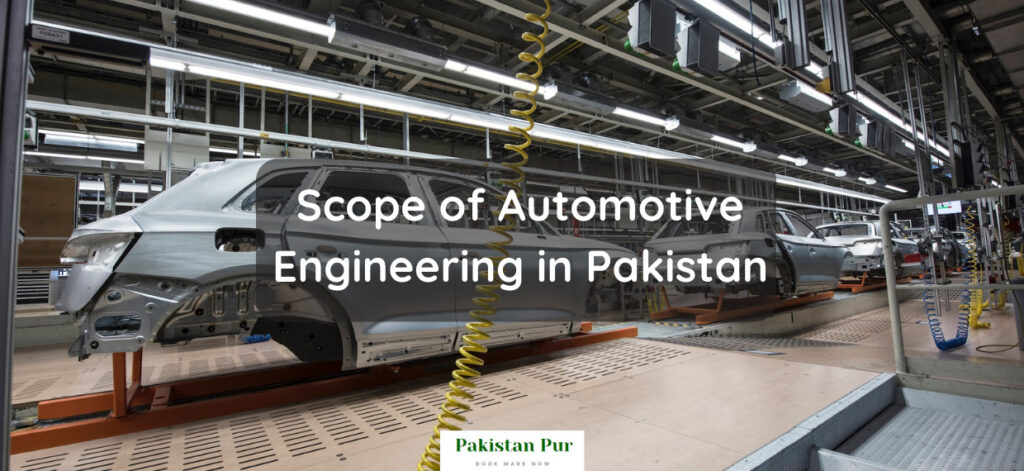
Table of Contents
The scope of automotive engineering in Pakistan is growing as the automobile demand is growing. The degree also gives you a chance to go abroad and get a suitable job there.
Automotive Engineering is a rapidly evolving field in Pakistan that amalgamates mechanical, electrical, and software engineering into one comprehensive discipline. Choosing this degree opens up a world of opportunities in diverse sectors such as aerospace and vehicle engineering.
Broad Career Opportunities
- Automotive engineering offers the chance to delve into the design, development, and manufacturing of various land vehicles.
- It provides an opportunity to gain in-depth knowledge of vehicle development.
The Cutting Edge of Innovation
- This field is at the forefront of technological advancement, with a focus on developing more efficient and sustainable transportation solutions.
Competitive Admissions
- Admission to these programs can be highly competitive. It’s crucial to prepare well for entrance examinations and have a solid academic background.
Strong Foundation Required
- A solid foundation in mathematics and physics is required. These subjects are integral to understanding the complex mechanics of automobiles.
Hands-on Learning
- Practical training and internships are key components of the curriculum. You’ll need a passion for hands-on learning and problem-solving.
Read this guide to know about the unviersities offering BS automotive engineering in Pakistan and the courses they teach.
BS Automotive Engineering Universities, and Courses 2023
Is Automotive Engineeting the Right Path for You?
Reputable universities like NUST and UET Lahore offer this course, ensuring you receive an education that aligns with international standards.
Choosing to study Automotive Engineering is not just about pursuing a degree; it’s about fueling your passion for innovation and vehicles. It’s about taking the driver’s seat in shaping the future of mobility.
So, if you’re ready to steer your career toward a path filled with endless possibilities and exciting challenges, Automotive Engineering could be the perfect fit for you.
Industries for BS Automotive Engineering Graduates
- Automotive Design: Automotive engineers work on every aspect of car design, from the aesthetic to the functional.
- Automotive Manufacturing: This industry involves the production of vehicles and their subsystems.
- Automotive Sales: Graduates can leverage their technical knowledge to excel in vehicle sales.
- Automotive Service and Parts: This sector focuses on vehicle maintenance, repair, and spare parts.
- Computer Systems Design: Automotive engineers may work on designing computer systems for vehicles.
- Construction: Engineers play a role in developing construction vehicles.
- Digital Integrated Circuits: This field involves creating integrated circuits used in automobiles.
- Semiconductor Devices: Graduates may work on semiconductor devices used in automotive technology.
- Embedded Systems: Engineers can specialize in designing and implementing embedded systems for automobiles.
- Vehicle Performance Enhancement: Automotive engineers work to enhance the technical performance of vehicles.
Freshers Automotive Engineer Salary
The automotive engineering field presents a promising career path for fresh graduates in Pakistan. As per PayScale, the per year average salary for an Automotive Engineer in Pakistan is Rs 1,800,000 in 2023.
SalaryExpert data indicates that the average salary for this profession is Rs 2,414,513 annually. Meanwhile, SalaryExplorer reports that those working in the automotive industry typically earn around 61,200 PKR.
On job boards like Indeed, entry-level positions in related fields such as mechanical engineering offer salaries ranging from Rs 30,000 – Rs 40,000 a month.
These figures suggest that fresh graduates in automotive engineering can anticipate competitive remuneration at the start of their careers.
Further Education after BS Automotive Engineering
- Master’s in Automotive Engineering: This advanced degree program offers specialized knowledge in areas such as engine systems, electric and hybrid vehicles, or automotive design.
- PhD in Automotive Engineering: For those interested in research or academia, a PhD offers the opportunity to contribute original research to the field.
- MBA (Master of Business Administration): An MBA can open doors to managerial roles in the automotive industry, combining technical knowledge with business acumen.
- Specialized Certifications: Certifications in areas like Electric Vehicle Technology, Automotive Software Engineering, or Automotive Safety can enhance your expertise and employability.
- Master’s in Mechanical Engineering: A broader field that allows for more flexibility in career paths, this degree can also lead to roles in automotive engineering.
- Master’s in Industrial Engineering: This degree provides a broader view of the manufacturing process, which can be beneficial for roles in automotive production.
Each of these options has its own pros and cons, and the best choice depends on your career goals and interests.
If you’re passionate about vehicle design, a Master’s in Automotive Engineering could be the perfect fit. If you’re more interested in the business side, an MBA might be a better choice. If you want to stay at the cutting edge of technology, consider a certification in an emerging area like Electric Vehicle Technology.




Leave a Reply